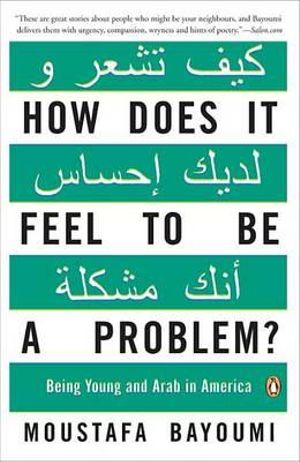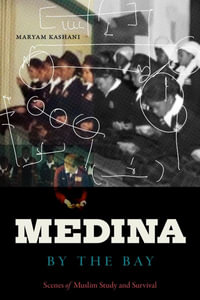
How Does It Feel to Be a Problem?
Being Young and Arab in America
By: Moustafa Bayoumi
Paperback | 1 July 2009
At a Glance
Paperback
$40.00
Aims to ship in 10 to 15 business days
When will this arrive by?
Enter delivery postcode to estimate
"Wholly intelligent and sensitively-drawn, How Does It Feel to Be a Problem? is an important investigation into the hearts and minds of young Arab-Americans. This significant and eminently readable work breaks through preconceptions and delivers a fresh take on a unique and vital community. Moustafa Bayoumi's voice is refreshingly frank, personable, and true." --Diana Abu-Jaber, author of Origin, Crescent, and The Language of Baklava
An eye-opening look at how young Arab- and Muslim-Americans are forging lives for themselves in a country that often mistakes them for the enemy
Just over a century ago, W.E.B. Du Bois posed a probing question in his classic The Souls of Black Folk How does it feel to be a problem? Now, Moustafa Bayoumi asks the same about America's new "problem"-Arab- and Muslim-Americans. Bayoumi takes readers into the lives of seven twenty-somethings living in Brooklyn, home to the largest Arab-American population in the United States. He moves beyond stereotypes and clich s to reveal their often unseen struggles, from being subjected to government surveillance to the indignities of workplace discrimination. Through it all, these young men and women persevere through triumphs and setbacks as they help weave the tapestry of a new society that is, at its heart, purely American.
Industry Reviews
"These are great stories about people who might be your neighbors, and Bayoumi delivers them with urgency, compassion, wryness and hints of poetry. You may walk away from the book with a much greater understanding of Arab-American life, but you'll feel that's simply because you've hung out with Bayoumi and friends, snarfing down Dunkin' Donuts or puffing on hookahs, talking about vital issues." --Salon.com
"Bayoumi's book fascinates." --Deborah Douglas, Chicago Sun-Times
"Moustafa Bayoumi's How Does It Feel to Be a Problem? has an intimate feel, as the author listens closely to the dreams and realities of seven young Arabs living in post-9/11 America." --Dallas Morning News
"an indispensable guide...a well-written book on a subject that is often overlooked or treated as a side note to bigger problems, like the occupation of Iraq, Israeli aggression and civil liberties." --The Arab American News
"Bayoumi succeeds in presenting the reader with more than just a glimpse into these lives. One is right there with Rasha, a Palestinian-American teenager, who was detained along with the rest of her family without reason following 9/11. This first story is the most chilling as one can sense the frustration and dread emanating from Rasha's story. I have heard about things like this happening but to actually read about 19-year-old Rasha and what she and her entire family had to endure is something else. Bayoumi's decision to talk to Arabs from Brooklyn was a wise one as these stories are reflections from a group of people that not only have bared the brunt of discrimination, but call New York City their home and therefore, 9/11 affected them as it did most New Yorkers. By providing a book accessible to the masses, Bayoumi gives the Arab problem a very human face that other Americans can empathize with." --MediaandIslam.com
"Bayoumi offers a revealing portrait of life for people who are often scrutinized but seldom heard from." --Booklist(starred review)
"In many ways, [Bayoumi's] absorbing and affectionate book is a quintessentially American picture of 21st century citizens 'absorbing and refracting all the ethnicities and histories surrounding [them].' However, the testimonies from these young adults--summary seizures from their homes, harassment from strangers, being fired for having an Arab or Muslim name--have a weight and a sorrow that is 'often invisible to the general public.'" --Publishers Weekly (starred review)
"The book's title derives from a question posed by W.E.B. Du Bois in The Souls of Black Folk, and given the burgeoning of anti-Arab, anti-Muslim sentiments since 9/11, the author's appropriation of it seems apt. [Bayoumi] poignantly portrays young people coming of age at a time when "informants and spies are regular topics of conversation...friendships are tested, trust disappears."" --Kirkus Reviews
"Wholly intelligent and sensitively-drawn, How Does It Feel to Be a Problem? is an important investigation into the hearts and minds of young Arab-Americans. This significant and eminently readable work breaks through preconceptions and delivers a fresh take on a unique and vital community. Moustafa Bayoumi's voice is refreshingly frank, personable, and true." --Diana Abu-Jaber, author of Origin, Crescent, and The Language of Baklava
"In relating the gripping personal stories of seven young Arab and Muslim Americans from Brooklyn in How Does it Feel to be a Problem, Moustafa Bayoumi reveals the feelings and frustrations of the current era's scapegoats, who can be demonized, profiled, and reviled without fear of sanction. His book shows both the dimensions of this new problem for American society, and the hopeful signs that this problem too can be overcome." --Rashid Khalidi, Edward Said Professor of Arab Studies, Columbia University and author of The Iron Cage
"Suspenseful storytelling and rich detail make How Does It Feel to Be a Problem? required reading for Americans yearning for knowledge about Islam and their Muslim neighbors in the United States. In a series of fascinating narratives about the horrors and conflicts young Muslim-Americans faced after 9/11, Moustafa Bayoumi has written a work that is passionate, yet measured, humorous, and above all enlightening." --Geneive Abdo, author of Mecca and Main Street: Muslim Life in America After 9/11
"With deft prose, acute insight and extensive reporting, Moustafa Bayoumi has produced truly engrossing portraits of young Muslim Americans about whom we usually hear only empty polemics. With a light touch, he gives voice to people who are referred to often and heard from rarely. The result is a sense of the tentative resistance of a besieged generation, as well as their determination to force America to be true to its promise even if it means confronting prejudice in its practice." --Gary Younge, author of Stranger in a Strange Land: Encounters in the Disunited States and No Place Like Home
ISBN: 9780143115410
ISBN-10: 0143115413
Published: 1st July 2009
Format: Paperback
Language: English
Number of Pages: 336
Audience: General Adult
For Ages: 18+ years old
For Grades: 12
Publisher: PENGUIN GROUP
Country of Publication: US
Dimensions (cm): 20.47 x 13.67 x 1.73
Weight (kg): 0.25
Shipping
| Standard Shipping | Express Shipping | |
|---|---|---|
| Metro postcodes: | $9.99 | $14.95 |
| Regional postcodes: | $9.99 | $14.95 |
| Rural postcodes: | $9.99 | $14.95 |
How to return your order
At Booktopia, we offer hassle-free returns in accordance with our returns policy. If you wish to return an item, please get in touch with Booktopia Customer Care.
Additional postage charges may be applicable.
Defective items
If there is a problem with any of the items received for your order then the Booktopia Customer Care team is ready to assist you.
For more info please visit our Help Centre.























